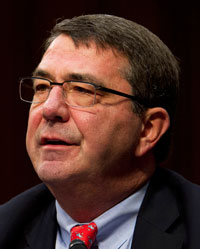US rebalance 'not in jeopardy' by budget cuts
Updated: 2013-04-10 00:23
By Joseph Boris in Washington (China Daily)
|
||||||||
A high-ranking Pentagon official said the United States' much-discussed "strategic rebalance" to the Asia-Pacific region will not fall victim to budget turmoil in Washington.
In a speech on Monday, US Deputy Defense Secretary Ashton Carter also stressed that the move is not directed against any particular nation.
 |
|
Ashton Carter, US Deputy Defense Secretary |
"It includes everyone in the region. It is not aimed at anyone — no individual country or group of countries," he said.
He reiterated the argument that, despite unease in Beijing about US intentions in the region, the rebalance is a continuation of US policies in the region since the end of World War II.
The strategy, which involves a redeployment of forces from the wars in Iraq and Afghanistan, "is the perpetuation of the pivotal American military role in the Asia-Pacific region which has had the effect … of providing the peace and stability that has allowed the countries of Asia — first Japan, then ROK, Southeast Asia, now China and India — to develop politically and economically in a climate that has been free from conflict", Carter said.
That role "has been a benefit to China, in my judgment", he added.
Carter, while stating the US case that the rebalance will protect economic interests such as the assurance of free and open sea lanes, detailed the list of US military assets that have already begun streaming toward the region. Many of these ships, fighter jets, bombers, reconnaissance aircraft and missile batteries are returning to their former US Navy and Air Force bases in the Asia-Pacific, he said.
"The end of the war in Iraq and the reduction in Afghanistan allow us to shift the great weight of effort from these wars to our stabilizing presence in the Asia-Pacific region," Carter said at the Center for Strategic and International Studies in Washington.
He warned against assumptions that the rebalance — sometimes called the "Asia pivot"— would fail or be limited by automatic cuts to the US federal budget that have forced the Pentagon to reduce spending by $41 billion during this fiscal year, which ends on Sept 30.
Although "very disruptive", the cuts imposed by Congress still leave the Defense Department room to execute the strategy, Carter said. The rebalance "is not in jeopardy", he said.
"Wherever we have flexibility, we are favoring and protecting the rebalance," the Pentagon official said.
He again sought to reassure China about the nature of the rebalance, focusing on stressing that recent moves of tactical military equipment to Pacific bases were only in response to several weeks of "provocations" from the Democratic People's Republic of Korea.

 At least 15 people stabbed at Texas college
At least 15 people stabbed at Texas college
 US to intercept DPRK missile if threatened
US to intercept DPRK missile if threatened
 2012 a peak year for archaeologists
2012 a peak year for archaeologists
 More research stations planned for Antarctica
More research stations planned for Antarctica
 Capital's jaywalkers to face fines: traffic chiefs
Capital's jaywalkers to face fines: traffic chiefs
 Feeling the H7N9 strain
Feeling the H7N9 strain
 UK mourns death of 'Iron Lady' Thatcher
UK mourns death of 'Iron Lady' Thatcher
 Xi promises a fair market
Xi promises a fair market
Most Viewed
Editor's Picks

|

|

|

|

|

|
Today's Top News
US not to intercept DPRK missile unless threatened
China's Qiaodan sportswear sues Michael Jordan
Rail to connect Beijing's new airport
Bill Gates: innovation improves philanthropy
Car parts found to contain toxic contents
TCM remedy sells out in H7N9-affected areas
China, Australia establish strategic talks
US rebalance 'not in jeopardy' by budget cuts
US Weekly

|

|






